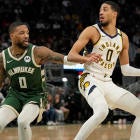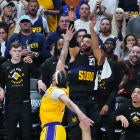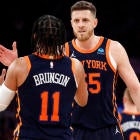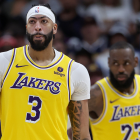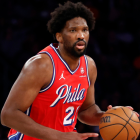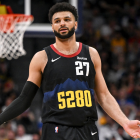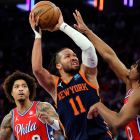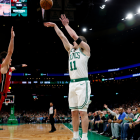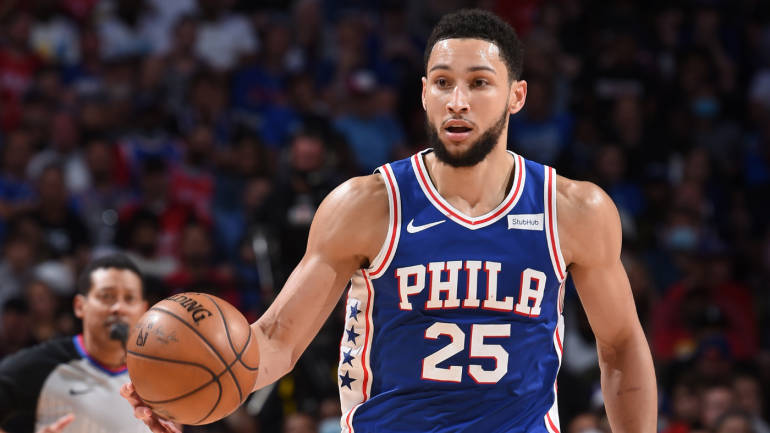
If the Philadelphia 76ers' famous, or infamous, Process was ever going to produce a championship or even a Finals berth, or hell, even a conference finals berth, this was the year. The seas have parted and practically invited their parade to come right on through.
Brooklyn is down Kyrie Irving and effectively James Harden. Milwaukee is a mess. Kawhi Leonard is out. LeBron James is out. Stephen Curry never got in. Damian Lillard and Luka Doncic are done. Chris Paul is in COVID-19 protocol.
Meanwhile, the Sixers are basically at full strength. Sure, Joel Embiid isn't 100 percent, but you wouldn't have known it at the start of Wednesday's pivotal Game 5 vs. the Hawks, when Embiid looked like prime Hakeem Olajuwon.
The Sixers were up by 26 points on the Hawks. And this didn't feel like one of those flimsy 20-point leads just waiting to evaporate. This was a total beatdown. Practically a done deal. The Sixers were on their way to a 3-2 series lead and the doorstep of their first conference final in the era of The Process, of whatever's left of it.
Now the whole script has been flipped.
Atlanta's 109-106 victory on Wednesday is the portrait of two ships passing in opposite directions. The Hawks are going places. You can hate Trae Young for talking the talk, but I'll be damned if that man isn't doing a whole lot of walking. Backing up the career-high 18 assists he dropped in Game 4, Young put up 39 points on Wednesday, the fifth 30-point outbreak in his first 10 career playoff games.

CBS Sports HQ Newsletter
Your Ultimate Guide to Every Day in Sports
We bring sports news that matters to your inbox, to help you stay informed and get a winning edge.
Thanks for signing up!
Keep an eye on your inbox.
Sorry!
There was an error processing your subscription.
Meanwhile, the only place the Sixers are going at this moment in time is back to the drawing board, and they're not going to find much in the way of solutions to their problems. You won't hear Embiid's name for the rest of this article. He's a stud. He is very much not the problem. Seth Curry is also a stud. Daryl Morey flipping Josh Richardson for him was one of the best moves of the offseason.
But are you ready for this? Other than Curry and the seven-foot stud whose name shall not be associated with this mess, not one Sixers player made a single shot in the second half of Wednesday's meltdown. Yes, you read that correctly. Ben Simmons, Tobias Harris, Furkan Korkmaz, Matisse Thybulle, Shake Milton, George Hill, Dwight Howard and Tyrese Maxey combined to shoot 0 for 11 in the second half.
Let's focus on the first two names on that dubious list: Simmons and Harris, who are under contract for a combined $360 million. Harris was 0 for 4 in the second half and 2 for 11 in the game for a total of four points. Elton Brand extending Harris on a five-year, $180 million deal is when Philly's Process, in reality, ended and the result of it went from promising to desperate.
Brand didn't have much of a choice. He'd already traded so much to get Harris in the first place, without any cap space to replace him, that he pretty much had to double down.
This is much of what has become of the Process. The Jimmy Butler trade cashed in a lot of the equity they'd built up, and then they lost Butler. The Harris trade shaved additional meat. Brett Brown was fired. The Markelle Fultz pick went bust. Just about every good shooter the team had was moved (JJ Redick, Robert Covington, Dario Saric, Marco Belinelli, Ersan Ilyasova, Landry Shamet). Simmons is half of what's remaining from years of suffering in pursuit of an opportunity like the one in front of the Sixers, and Harris stands in place of a lot of parts preceding him.
Harris had a good season. But he's out of his depth as a primary perimeter creator of shots.
This brings us back to Simmons.
This is supposed to be his gig. You know all those apologists who love to tell you about all the things Simmons does for the Sixers that we mere casual basketball consumers can't possibly fathom? Outside of his defense, one of the things they point to is his shot creation. They love to tell you how it doesn't matter if Simmons scores because he creates opportunities for other people to score.
But the dirty little secret these apologists either don't understand or don't want to cop to is that when you aren't a threat to shoot or score yourself, your ability to create for others is severely limited. It's why Lonzo Ball, who was heralded as a brilliant passer coming out of college, never had much impact running an offense, because the most effective way to create openings for your teammates is to draw defenders away from them and toward yourself.
Ball has made great strides as a shooter and has become more aggressive as a scorer every season. What has Simmons changed or improved about his offensive game? It's been five years since Simmons was drafted and still no defender is coming toward him unless it's to intentionally foul him. He can't shoot. He won't shoot. I honestly don't know which is it, exactly, but either way, his reluctance to get in the scoring mix is handicapping his team and own development.
Sure, he can get some coast-to-coast buckets (he used to, at least) and every once in a while he'll get your optimism stirring with a post move or a cut. But when the fast breaks and free-wheeling regular-season music stops and the actual earn-your-buckets half-court grind of the postseason begins, he is, for the most part, just out there.
As a non-shooter, Simmons has to double down on other potential areas of half-court impact, lest he turn into a statue without the built-in value of being, at the very least, a spacer. But Simmons doesn't commit to cutting or rolling hard. He doesn't seal for high-lows with Embiid or establish consistent deep post position on mismatches. He sets screens as a matter of minimum obligation, and then, too often, fades out of the play.
On Wednesday, Simmons took one shot in the second half. One. This is after he said, following his similarly scared second-half showing in Philly's Game 4 meltdown (Over the last two fourth quarters, Simmons hasn't taken one shot in almost 17 minutes of game time), that he "definitely should have been more aggressive and attacked more."
That's not just about scoring. Simmons creates a ton of 3-point buckets for his teammates in the regular season by forcing his way into the paint and kicking and pushing in transition. That guy disappears way too often, and too easily. Perhaps the reason he doesn't want to attack is he's worried about getting fouled and having to go to the line. The guy is shooting 33 percent from the stripe in the playoffs (22 for 67).
Do the math, and that's 45 shanks for Simmons so far. That's more than the Hawks (35), Suns (29) and Nets (22) have missed as a team. On Wednesday, Simmons went 4 for 14 from the line, making him the first player this season -- regular or post -- to miss 10 free throws in a game. There was a time when Simmons was losing postseason fourth-quarter minutes because the great T.J. McConnell was a bigger threat to do, well, anything on the offensive end. Now he's getting benched in the fourth quarter so the other team doesn't intentionally foul him. That's called a liability. Not a franchise player.
Simmons surely wasn't the only reason the Sixers blew this game on Wednesday. Again, Harris was awful. Doc Rivers tried his best to outdo Mike Budenholzer for the worst coaching performance of the season; seriously, what were some of those lineups he was throwing out there? The all-bench unit? And if you know the Hawks are going to foul Simmons intentionally, thus negating any need for offensive spacing and shooting, why is Korkmaz in the game? Put some defense out there one time.
Also, give the Hawks credit. This team is no joke. Travis Schlenk has really put something together, and Nate McMillan has adapted his philosophies to fit the roster Schlenk handed him. But Philly is now the first team in the last quarter-decade to blow at least an 18-point lead in back-to-back playoff losses. The Hawks aren't that good.
So it's back to the drawing board for the Sixers as they try to keep this golden opportunity of a season alive. They'll have to do it on the road in Game 6, then come back home and win Game 7, and at the risk of making this situation overly simplistic, that is not going to happen unless Ben Simmons turns into at least a fraction of the player his apologists want you to believe he is.














